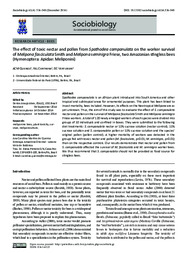The effect of toxic nectar and pollen from Spathodea campanulata on the worker survival of Melipona fasciculata Smith and Melipona seminigra Friese, two Amazonian stingless bees (Hymenoptera: Apidae: Meliponini).
The effect of toxic nectar and pollen from Spathodea campanulata on the worker survival of Melipona fasciculata Smith and Melipona seminigra Friese, two Amazonian stingless bees (Hymenoptera: Apidae: Meliponini).
Author(s): QUEIROZ, A. C. M.; CONTRERA, F. A. L.; VENTURIERI, G. C.
Summary: Spathodea campanulata is an African plant of African origin introduced in South America and other tropical and subtropical areas for ornamental purposes. This plant is related to insect mortality, bees included. However, its effects on the Neotropical Melipona are yet unknown. Thus, this study aimed to evaluate the effect of S. campanulata nectar and pollen on the survival of Melipona fasciculata and M. seminigra workers. A total of 120 newly emerged workers of each species were confined in boxes, without the presence of the queen, and divided in groups of 10 individuals. They were submitted to the following diets: S. campanulata nectar or 11% sucrose solution (nectar control); 11% sucrose solution and S. campanulata pollen or 11% sucrose solution and the species? original pollen (pollen control). The higher mortality of workers was detected on the experimental groups, with toxics nectar and pollen (M. fasciculata, p<0.01; M. seminigra, p<0.01) than on the respective controls. Our results point that nectar and pollen affected the survival of M. fasciculata and M. seminigra worker bees. Thus, S. campanulata is not a recommended plant to provide food resources for stingless bees.
Publication year: 2014
Types of publication: Journal article
Unit: Embrapa Eastern Amazon
Keywords: Abelha, Meliponicultura
Observation
Some of Embrapa's publications are published as ePub files. To read them, use or download one of the following free software options to your computer or mobile device. Android: Google Play Books; IOS: iBooks; Windows and Linux: Calibre.
Access other publications
Access the Agricultural Research Database (BDPA) to consult Embrapa's full library collection and records.
Visit Embrapa Bookstore to purchase books and other publications sold by Embrapa.

